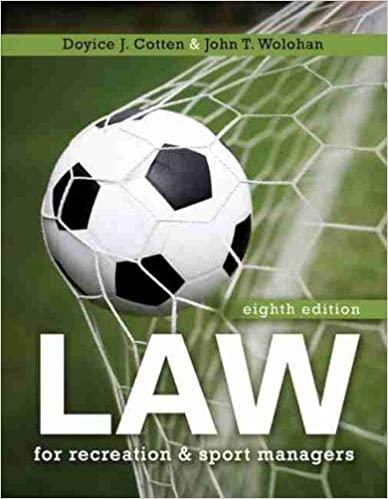Question
The Articles of Association of XYZ Ltd. (the company) made it mandatory for all the deeds to be signed by the managing director, the secretary,
The Articles of Association of XYZ Ltd. (the company) made it mandatory for all the deeds to be signed by the managing director, the secretary, and a working director on behalf of the company. The secretary and the working directory of the company signed a mortgage deed (which was executed in the favour of the another company ABC Ltd. (the plaintiff) against some debt taken by XYZ Ltd. from ABC Ltd. At a later date, the company opted for voluntary liquidation and sold the mortgaged property to PQR Ltd. The plaintiff (ABC Ltd.) then approached the court and argued that the sale of property was wrong as that property was mortgaged with ABC Ltd.
XYZ Ltd. denied to admit that the document was executed by and on behalf of the company, as the secretary and working director were not competent to contract loan. ABC contended that the Managing Director had been dismissed and was under prosecution on a criminal charge at the time the document was executed. Therefore, secretary and the working director executed the deed on behalf of the company as the services of the managing director were not available. Therefore, the mortgaged deed was regularly contracted in accordance with the powers and authority possessed by the said director and secretary under the articles of the said company (XYZ Ltd.).
ABC Ltd. Requested to court to set aside the sale of mortgaged property to PQR as the company could not sell the mortgaged property to anyone without discharging the liability of debt taken from ABC. On the other hand, XYZ contended that the mortgage deed was not binding on the company as it was signed by incompetent persons as per the provisions of Articles of the company.
1. Was the mortgage deed signed on behalf of the company by secretary and the working director, binding on the company? Why or why not?
2. In the circumstances mentioned above, which principle of companies Act will you apply to decide the liability of company? Explain the principle and its application in the above case.
Step by Step Solution
There are 3 Steps involved in it
Step: 1

Get Instant Access to Expert-Tailored Solutions
See step-by-step solutions with expert insights and AI powered tools for academic success
Step: 2

Step: 3

Ace Your Homework with AI
Get the answers you need in no time with our AI-driven, step-by-step assistance
Get Started


